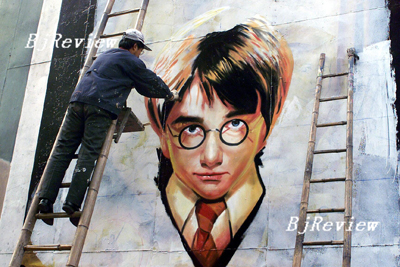
Four years ago 9-year-old Bian Jinyang, like many Chinese children, finished reading his first Harry Potter book. Different from his peer Potterites who merely knew the book inside out, Bian decided to go a step further and write a book even better than the best-selling series.
EnTitled The Magic Violin, Bian's story features a boy called Gao Jila on a quest to find his father. With the help of a magic violin, he goes back in time to the Tang Dynasty (618-907), travels to the earth's core, and lands on the planet Carter, during which he has a series of adventures.
The book, which came out in April 2003, rocketed to the top of the bestseller chart for that month, and its publishers were quick to call the book "China's Harry Potter," also announcing on its publication a U.S. company had bought the overseas copyright for $150,000, which created a new record as the most lucrative copyright export for a single Chinese book. As there is low demand for the works of even the most distinguished Chinese writers in the English book market, it is quite remarkable, even unbelievable, that a 9-year-old boy could command this level of commercial success.
After duplicating the success in his next few novels, which sold more than 1 million copies, Bian donated over 1 million yuan from his profits to children in poverty-stricken areas. He believed the money would be best spent enabling more children to read.
Now a high school student and the youngest in his class, Bian has skipped grades in his schooling several times, and credits his success to his love of reading. "I feel I have benefited a lot from reading and I aspire to pass the joy of reading to more peers. I am happy that the booming children's book market can provide people with more wonderful books," said Bian.
China has an under-18-year-old population of 367 million or 28 percent of its total population, behind which is a huge reading market. Although new media like television and the Internet are making inroads into children's reading time, books still play an irreplaceable role. The continuing popularity of children's books in China is proved by market figures. For the last few years, children's books have steadily occupied 10 percent of the total value of China's book market. In 2006, the year-on-year retail volume growth rate for children's books was 5 percent higher than the average level for the book retail market.
Of China's more than 570 publishing houses, about 520 have published at least one children's book. Over 130 publishers have specialized children's departments.
Wizard boy
When the Korean version of The Magic Violin debuted, the South Korean media credited Bian with possessing the potential to catch up with J.K. Rowling. Literary critics say this comment is a more advertising language than reality. They believe that Bian's is not a mature literary work, and should not be mentioned in the same breath as J.K. Rowling. Many literature critics say that imagination is only one vital component for creating successful works of literature. An author's life experiences, emotions and writing skills are important conditions for producing a real masterpiece.
Nonetheless, Bian has his own fan-base. "His writing style is quite interesting and the visible childish tone has made the work particularly lovely," said another teenage author Liu Dongyang, who published his own imaginary story at the age of 9.
"As I read the book, I thought The Magic Violin could be my story only I am not as imaginative as the author. I feel the story is so real and could happen around me. The story said things that I want to say," said Beijing reader Cai Xiaoxiao, who is of the same age as Bian.
Many children readers of The Magic Violin have had the same experience of being forced to learn to play the violin as the protagonist in the novel. Bian used himself as the model for the book as he was forced by his mother to learn to play the violin, in which he had no interest. Bian later hung the violin on the wall as a dartboard. It was not until Bian's mother Yang Zunhong read The Magic Violin that she understood that forcing children to learn things against their will could be harmful to their development.
The new genre of teenage magic novel writers is avidly pursued as they can easily become bestsellers. According to a survey of Beijing Open Book Market Consulting Center, the works of teenage writers occupy more than 10 percent of the total literature market. The commercial success of the Harry Potter series has generated an unprecedented enthusiasm for both writers and publishers.
Xiao Liyuan, an editor at China Children's Press & Publication Group, said the popularity of the Harry Potter books in China is attributable to many factors rather than just the tag of an imported bestseller. Xiao said, "This series of books excel in content and writing skill as well as marketing strategy."
Zheng Zhong, an editor of Zhejiang Juvenile and Children's Publishing House, summarized the success recipe for imported fantasy books in China. Firstly, a fascinating imagination can easily transcend cultural barriers; secondly, China mainly imports books that have already become bestsellers in their native country; thirdly, Chinese publishers that get the copyright for these books are usually renowned publishers with rich marketing experience and resources.
Marketing strategies
Harry Potter's leading place in the children's book chart has been challenged by the Tiger Team novels by Austrian writer Thomas Brezina, which sell incredibly well in China. Over 13.5 million copies of the various books have been sold since 2001, which has put Brezina ahead of J. K. Rowling as the most widely read foreign author in China.
| 